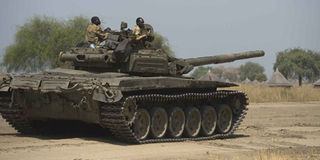South Sudan to try rebel leaders, risking ceasefire

South Sudanese government soldiers in an armoured vehicle near a village in Bor where an exchange of heavy artillery fire rocked the strategic town on January 26, 2014. AFP PHOTO / ALI NGETHI
What you need to know:
- Justice Minister underscores the animosity that still reigns between government forces under President Salva Kiir and a loose coalition of rebel fighters seen as loyal to Kiir's sacked deputy, Riek Machar.
- Eleven ex-officials were arrested, while Machar -- who denied any coup plot -- fled.
JUBA, Wednesday
South Sudan says it will put key leaders of an alleged coup it claims triggered weeks of fighting on trial, in a move likely to threaten a fragile ceasefire with rebels.
Both sides implemented a ceasefire last Friday, but combat has only eased, not ended, with reports of continuing clashes and a worsening humanitarian crisis that has left thousands dead and forced almost 800,000 to flee their homes. (READ: Govt, rebels breach South Sudan ceasefire)
United Nations aid chief Valerie Amos wraps up a three-day visit Wednesday to the war-torn country, where she has seen first hand the results of over six weeks of bloodshed, with horrific atrocities reported to have been committed by both sides. (READ: Aid chief visits South Sudan)
In an announcement made late Tuesday, Justice Minister Paulino Wanawila underscored the animosity that still reigns between government forces under President Salva Kiir and a loose coalition of rebel fighters seen as loyal to Kiir's sacked deputy, Riek Machar.
REVENGE ATTACKS
Four men in detention will face trial while three others, including Machar as well as rebel peace delegate leader Taban Deng -- who signed the ceasefire -- will face justice if caught, Wanawila said.
Kiir accused Machar and other former officials of a failed coup against his government after fighting broke out in the capital Juba on December 15.
Eleven ex-officials were arrested, while Machar -- who denied any coup plot -- fled. Fighting quickly spread across the country. Aid groups say up to 10,000 people have been killed in the conflict, although many fear more may have died.
The fighting has seen waves of brutal revenge attacks, as fighters and ethnic militia use the violence to loot and settle old scores.
Many fear the conflict has slid out of the control of political leaders, with ethnic violence and revenge attacks between the Dinka people of Kiir and the Nuer of Machar, the country's two largest groups. Over 76,000 civilians are still sheltering inside UN peacekeeping bases.
Government and opposition rebels are still fighting for control in key areas, with the United Nations calling the situation "fragile".
FRESH CLASHES
Clashes were reported Wednesday in the oil-producing Unity state, close to the settlement of Leer, Machar's home region.
Aid workers have said they were struggling to cope with those needing support.
"The crisis today is already very severe, you have hundreds of thousands of people displaced, and many, many wounded, who have come to our facilities," said Arjan Hehenkamp, from Medecins sans Frontieres (Doctors Without Borders, MSF).
"We face an emergency today, for many more than only the displaced, and we will continue to see that for the next six months and probably into the next year."
MSF has pulled out staff from its clinic in Leer fearing violence.
"The patients and staff have fled the hospital into the bush in order to be able to wait and see what the coming days will bring," he said.
Both sides say the other has already broken the ceasefire, but insist they are committed to the deal.
USE POWER
The release of prisoners has been a key demand of the rebels, and a document calling for their freedom was signed alongside the ceasefire deal last week.
But prisoners have been divided into three categories: some to be tried, others suspected of involvement but who will be released to a third country -- not yet named -- and others who would be released without charge.
Wanawila late Tuesday repeated the coup allegation against Machar and said some rebel leaders would be tried.
"If someone violates the law you don't go and torture that person, you prosecute that person according to the law," he said.
Kiir has hinted he could use his power to grant amnesties but has said that legal processes must be completed first.
The ceasefire was brokered by the regional East African bloc, the Intergovernmental Authority on Development (Igad), which plans to send observers to South Sudan to monitor the truce.
But diplomats say the 18 unarmed observers being sent by IGAD will not be able to keep up with events in the impoverished and vast country with few roads.





